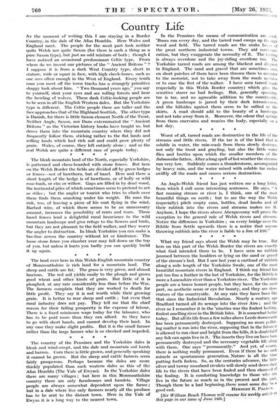* * * * The country of the Pennines and
the Yorkshire dales is bleak and wind-swept,, and the dale and mountain soil harsh and barren. Corn there is little grown, and generally speaking it cannot be grown. But the sheep and cattle farmers seem fairly prosperous. Perhaps because the dales are more thickly populated than such western dales as this of the Mon Honddu (The Yule of Ewyas). In the Yorkshire dales there are many villages ; but here in this Monmouthshire country there are only farmhouses and hamlets. Village people are always somewhat dependent upon the farms ; but in a dale where live only farmers nearly all the produce has to be sent to the distant town. Here in the Yule of Ewyas it is a long way to the nearest town.
In the Pennines the means of communication are ,rood. 'Buses run every day, and the tarred road creeps up tlip,ugh wood and field. The tarred roads are the snake heads of the great northern industrial towns. They aid cone:mei- cation, but they exaggerate the necessity of it. The tarrint, is always overdone and the joy-riding overdone too. The Yorkshire tarred roads are among the blackest and dingiest in England. The sand and gravel that are sometimes seen on short patches of them have been thrown there to minister to the motorist, not to take away from the roads ugliness or to ease the feet of the walker. I have seen tarred roads (especially in this Welsh Border country) which give the sensitive starer no bad feelings. But, generally speaking, tar is tar, and no agreeable addition to the countryside. A green landscape is jarred by their dark intrusiveness, and the hillsides against them seem to be sullied at the skirts. A road should add to the beauty of a landscape and not take away from it. Moreover, the odour that springs from them enervates and wearies the body, especially on a
hot day.
















































 Previous page
Previous page